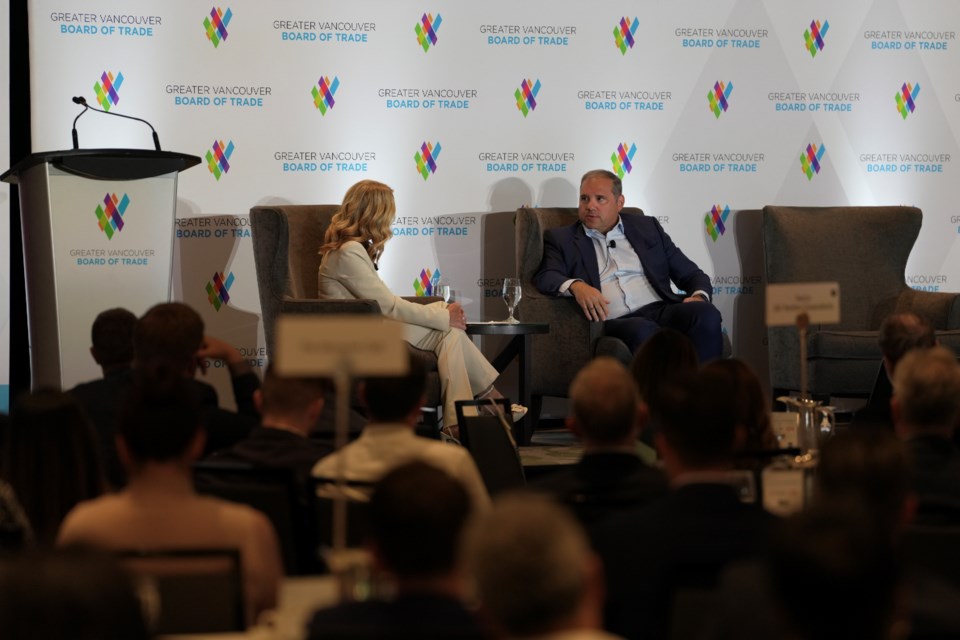With just one year to go until Vancouver hosts the FIFA World Cup, organizers are still grappling with hotel shortages, infrastructure gaps and unanswered questions about health-care capacity.
Those were the main themes at the Greater Vancouver Board of Trade’s FIFA one-year countdown event Tuesday.
One of the lingering challenges of the World Cup that’s different from previous events held in Vancouver is the uncertainty over which teams will play in the city, Jessie Adcock, FIFA World Cup 26 Vancouver host committee lead, said at the downtown event.
The official team draws will be held sometime in December 2025.
That plays a large role in the planning and framework being done before the tournament, such as the World Cup fan festival at the PNE, the preparation of the player training sites and how Vancouver International Airport will handle an influx of visitors, said Adcock.
The World Cup will officially kick off June 11, 2026, with games in Mexico City and Guadalajara. The event’s final will be played July 19, 2026, in New York/New Jersey.
Vancouver will host seven matches across 25 days during the tournament.
Hotel capacity will prove challenging, according to Destination Vancouver CEO Royce Chwin. He said Vancouver has the same amount of hotel rooms now as it did in 2002.
“We kept our eye off the ball … we got ourselves in this situation,” Chwin said at the event. “Metro Vancouver has approximately 20,000 hotel rooms, not including the short-term rentals.”
Hotel room supply in downtown Vancouver declined by 10 per cent between 2002 and 2022, according to an April report from Destination Vancouver and the BC Hotel Association.
Twelve new hotels have been built in Vancouver over the last 20 years, representing an addition of 1,900 total hotel rooms, said the report. However, 4,200 rooms are now in the pipeline.
Conversations are ongoing with the provincial government and the City of Vancouver to allow short-term exemptions to increase room stock for before, during and slightly after the World Cup, said Chwin.
“We have to be very careful, though, establishing a precedent and having rules,” he said. “Once you give something, can you take it back?”
Vancouver hotels are now operating close to full capacity, with an average of 80 per cent annual occupancy and up to 95 per cent during peak seasons, according to the April report. Destination Vancouver and the BC Hotel Association said Vancouver needs 10,000 new hotel rooms by 2050—a 70 per cent increase from today’s inventory.
Vancouver’s health-care capacity is also in question, according to a professor at the UBC School of Population and Public Health.
If nursing stations and emergency urgent care centres for visitors run in parallel with the existing health-care system, it’s not clear that crowds would stress infrastructure, Jason Sutherland told BIV in March.
The health-care system could use some of the event’s revenue to hire additional staff and pay double time for emergency workers, he said. The other option, and perhaps the one with the poorest outcome, according to Sutherland, would be to do nothing and hope the system absorbs demand.
For this case, there could potentially be some displacement of health-care services in a system where emergency departments and hospitals are already under pressure, he said.
Beyond these obstacles, the World Cup is an opportunity of a lifetime for Canada to develop the sport, said Victor Montagliani, FIFA vice-president and Concacaf president.
The 76th FIFA Congress on April 30, 2026, will also be held in Vancouver. This weeklong annual event brings together the soccer-governing bodies of 211 countries to discuss matters and make decisions regarding the FIFA organization.
From a business standpoint, the FIFA Congress and the World Cup will be a gateway to every market in the world at the top level, Montagliani said.
He said the business community shouldn’t look at the World Cup as an opportunity to make ticket sales, but as an opportunity to attach their brand to one of the biggest sporting events in the world.
“Being from Vancouver, I really don't know, in some ways, how big this is going to be,” Montagliani said. “This is just another level.”
Work to replace the turf surface in BC Place for real grass is expected to begin in the first quarter of next year, he said.
Meanwhile, the Vancouver Whitecaps FC have had a positive season so far. The team currently sits at the top of the league’s Western Conference and played in the Concacaf Champions Cup on June 1.
The Whitecaps confirmed the team was up for sale in December 2024. Forbes estimated the team’s value at US$420 million earlier that year.
For Montagliani, the idea of the Whitecaps leaving Vancouver would be a “capital crime,” especially following the upgrades to BC Place and Vancouver co-hosting the World Cup.
“I don't think [they're] going to leave,” he said, adding that having an upgraded stadium where fans can enjoy watching football is as big as the seven world cup matches coming to Vancouver next year.
–With files from Jami Makan and Glen Korstrom





